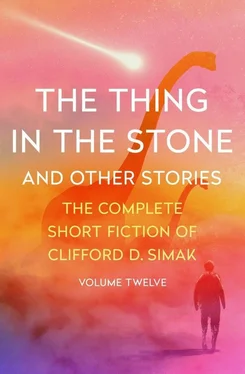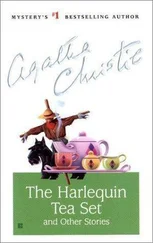Dr. Daniel Monk laid the pencil aside, read once again the laborious lines of translation:
This is the story of … who visited the fifth planet from the central sun; not the first to go there, but the first to discover the life that lived thereon, a curious form of life that because of its … had not previously been recognized as life—
Outside the thin night wind of Mars had risen and was sweeping the city of Sandebar, whining and moaning among the cornices and columns of the museum. Drift sand pecked with tiny fingers against the windows and the brilliant Martian starlight painted frosty squares on the floor as it came tumbling through the casement.
This is the story of—
Dr. Monk frowned at that. The story of whom? Probably, he told himself, he would never know, for the vocabulary made available by the Rosetta scroll did not extend to personal names.
With a wry smile he picked up his pencil again, wrote “John Doe” in the blank. That was as good as any name.
This is the story of John Doe—
But that didn’t answer another question. It didn’t tell why the life of the fifth planet had not been recognized as life.
The fifth planet, without a doubt, was the planet which in another eon had traveled an orbit between Mars and Jupiter—the planet now represented by the Asteroid Belt, a maelstrom of planetary debris. It would have been the planet, it and the Earth, most accessible to Mars. It was natural the Martians should have gone there. And that they had known the planet before its disruption gave a breath-taking clue to the incredible antiquity of the scroll from which the passage had been translated.
Perhaps, Monk told himself, one of the other scrolls might tell of the actual breakup of the fifth planet, might give a clue or state a cause for its destruction. There were thousands of other scrolls, the loot of years from the ruins of Martian cities. But until this moment they had been voiceless, mute testimony the Martians had possessed a written language, but telling nothing of that language, revealing none of the vast store of information they held.
A curious form of life that because of its—
Because of its what? What form could life take, what trick could it devise to hide its being? Invisibility? Some variant of protective coloration? But one couldn’t write “invisibility” into the text as one had written “John Doe”.
Perhaps some day, Monk told himself, he might find the answer, might be able to write in that missing word. But not now. Not yet. The Rosetta scroll, for all its importance, still left much to be desired. It necessarily had to leave much to be desired, for it dealt in a language that sprang from a different source than Terrestrial language, developed along alien lines, represented thought processes that could have been—must have been—poles apart from the thoughts of Earth.
All that the Martian language held in common with Earthian language was that both represented thought symbols. That was all; there was very little similarity in the way they went about doing that same thing.
Monk reached out and lifted the heavy metal cylinder from the desk before him. Carefully, almost reverentially, he flipped open the lock that released one end of the cylinder, drew out the heavy, lengthy scroll that had provided the key to the thoughts, the works, the ways of the ancient race of Mars.
He unrolled it slowly, gently, squinting at the faded characters, faint with a million years or more of being buried in the sands of Mars.
A dictionary once—a dictionary again, but in a different way.
Monk wondered what sort of a long-dead personality had penned that dictionary. Scholar, seeking no more than the ways of truth? Businessman, seeking to facilitate a better lingual understanding, therefore a better commercial understanding, between the race of Mars and the now decadent races of the Jovian moons? Statesmen, trying to bring about a good-neighbor policy?
The Martian, however, whoever he might have been, had not understood that Jovian language too well, for some of the words and idioms didn’t check with the Jovian language as Earthmen knew it. Or it might have been that the language itself had changed. Perhaps in that long-gone day when the scroll was written the moon men of Jupiter had not been decadent.
On that point, Monk knew, the Jovians themselves could throw little light. There were ruins, of course, and legends, but the legends were utterly crazy and the ruins held no traditional sentiment for the tribes of Europa or Ganymede. Unlike most peoples, they held no racial memories of a more glorious past, of a forgotten golden age.
It was a roundabout way, a long way, an awkward way to read the language of Mars, Monk reflected. Martian to Jovian to Earthian. But it was better than no way at all.
The clock on the manuscript cabinet chimed briefly, apologetically. Monk glanced at it and started in surprise. Midnight. He had not realized it was that late. Suddenly he knew that he was tired and hungry, needed a drink and smoke.
He rose and walked to a table, found a bottle and glass, poured himself a drink. From somewhere, far in another part of the vast building, came the ghostly sound of a watchman’s tread, making his rounds. The sand talked and hissed against the window.
Back at his desk, Monk sipped at his drink, staring at the metallic tube, thinking of the faint scrawlings on the scroll inside.
A Rosetta stone—the Rosetta stone of Mars. Brought in off the desert by a man who might just as easily have passed it by. Uncovered by shifting sand that in the next hour might just as well have covered it again for all eternity.
Monk lifted his glass to the weathered cylinder.
“To destiny,” he said, and drank before he realized how silly it sounded.
Or was it silly? Might there not really be such a thing as destiny? An actual force moving to offset the haphazard course of a vagrant universe? Sometimes it seemed so. Sometimes—
Monk emptied the glass, set it on the desk, dug into his pocket for cigarettes. His fingers closed on a small package and he drew it out wonderingly, brow wrinkled. Then, quickly, he remembered. It had been in his mail box that morning. He had meant to open it later, had forgotten it until now.
He examined it curiously. It bore no return address and his own was laboriously printed by hand. He ripped the fastening tapes with his fingernails, unwrapped the paper.
A jewel box! Monk snapped up the lid and stiffened in surprise.
In its bed of rich velvet lay the gleaming roundness of an Asteroid jewel. It glowed softly under the desk lamp, colors flowing and changing within its heart, almost as if the jewel itself might be in motion.
There was no card. Nothing to indicate who had sent the jewel or, more important, why it had been sent. Asteroid jewels, Monk knew, weren’t something to be just sent around to anyone for no reason at all. The stone before him, he realized, had a value that ran close to five figures.
Almost fearfully, he lifted the gem between thumb and forefinger, held it to the light and caught his breath in wonder as it blazed with soul-stirring beauty.
With a feeling that approached awe, he replaced it, sat quietly in his chair watching it.
Queer things, the Asteroid jewels, queer in more ways than one.
No one knew just what they were. No Asteroid jewel had ever been analyzed. Spectrographically, they were like nothing science had ever known. They could be broken down chemically, of course, but even then they were impossible of analysis. Something there to analyze, naturally, but with certain baffling characteristics no chemist had yet been able to tie down and catalogue.
Found nowhere else in the Solar System, they were the magic that drove men to lives of bitter privation in the Belt, searching among the debris of a dead planet for that tiny gleam in the jumbled rocks that would spell riches. Most of them, as could be expected, died without ever finding a single jewel; died in one of a vast variety of horrible, lonely ways a man can die among the Asteroids.
Читать дальше












